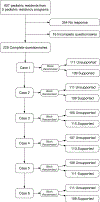Simple Interventions for Pediatric Residents' Moral Distress: A Randomized, Controlled Experiment
- PMID: 37153965
- PMCID: PMC10416266
- DOI: 10.1542/peds.2022-060269
Simple Interventions for Pediatric Residents' Moral Distress: A Randomized, Controlled Experiment
Abstract
Background and objectives: Pediatric residents are at high risk for moral distress, knowing the moral or ethically right thing to do but feeling unable to do it, which is associated with poor patient care and burnout. Researchers have proposed numerous interventions to reduce distress, but few (if any) have been supported by experimental evidence. In this study, we used an experimental method to provide proof-of-concept evidence regarding the effect of various simple supports on pediatric residents' reported degree of moral distress.
Methods: We conducted a study of pediatric residents using a split sample experimental design. The questionnaire contained 6 clinical vignettes describing scenarios expected to cause moral distress. For each case, participants were randomly assigned to see 1 of 2 versions that varied only regarding whether they included a supportive statement. After reading each of the 6 cases, participants reported their level of associated moral distress.
Results: Two hundred and twenty respondents from 5 residency programs completed the experiment. Cases were perceived to represent common scenarios that cause distress for pediatric residents. The addition of a supportive statement reduced moral distress in 4 of the 6 cases.
Conclusions: In this proof-of-concept study, simple yet effective interventions provided support by offering the resident empathy and shared perspective or responsibility. Interventions that were purely informational were not effective in reducing moral distress.
Copyright © 2023 by the American Academy of Pediatrics.
Conflict of interest statement
Figures



Comment in
-
"We've Got Your Back:" The Role for Faculty in Easing Moral Distress for Residents.Pediatrics. 2023 Jun 1;151(6):e2023061372. doi: 10.1542/peds.2023-061372. Pediatrics. 2023. PMID: 37153968 No abstract available.
References
-
- Jameton A. Nursing Practice: The Ethical Issues. Prentice-Hall; 1984.
-
- Epstein EG, Hamric AB. Moral distress, moral residue, and the crescendo effect. J Clin Ethics. 2009;20(4):330–342. - PubMed
Publication types
MeSH terms
Grants and funding
LinkOut - more resources
Full Text Sources

